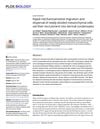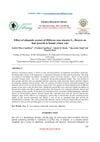44 citations,
April 2013 in “Proceedings of the National Academy of Sciences of the United States of America” FGF13 gene changes cause excessive hair growth in a rare condition.
 1 citations,
July 2024 in “Skin Research and Technology”
1 citations,
July 2024 in “Skin Research and Technology” High-frequency ultrasound can effectively visualize and assess hair loss.
April 2019 in “The journal of investigative dermatology/Journal of investigative dermatology” Disrupting the Tsc2 gene in certain cells leads to thicker skin, larger hair, and changes in hair growth signaling, which can be partly reversed with specific treatment.
 April 2018 in “The journal of investigative dermatology/Journal of investigative dermatology”
April 2018 in “The journal of investigative dermatology/Journal of investigative dermatology” Electrical epilation damages hair follicles and surrounding skin, likely preventing hair regrowth.
1 citations,
December 2023 in “Biomolecules” Regulating cell death in hair follicles can help prevent hair loss and promote hair growth.
 13 citations,
February 2018 in “Bio-medical Materials and Engineering”
13 citations,
February 2018 in “Bio-medical Materials and Engineering” Minoxidil inside tiny particles can deliver more drug to hair follicles, potentially improving treatment for hair loss.
 73 citations,
September 2003 in “Journal of Pharmacology and Experimental Therapeutics”
73 citations,
September 2003 in “Journal of Pharmacology and Experimental Therapeutics” Hair color loss can indicate the effectiveness of a drug targeting the KIT protein in mice and humans.
Hirsutism is excessive male-pattern hair growth in women, often treated cosmetically or with hormone therapy if contraception is also desired.
 53 citations,
October 1984 in “Endocrine reviews”
53 citations,
October 1984 in “Endocrine reviews” Excessive hair growth in women often has no known cause and is not linked to race or other hormonal symptoms.
 2 citations,
September 2023 in “PLoS biology”
2 citations,
September 2023 in “PLoS biology” Newly divided skin cells quickly move to join skin structures due to tissue tension and specific signals.
 16 citations,
April 1984 in “Archives of Dermatology”
16 citations,
April 1984 in “Archives of Dermatology” Topical minoxidil can help hair regrowth in alopecia areata patients, but maintaining the growth after stopping treatment is inconsistent.
 78 citations,
April 1984 in “Archives of Dermatology”
78 citations,
April 1984 in “Archives of Dermatology” Minoxidil can help regrow hair in alopecia areata patients.
 January 2022 in “Food Science and Technology”
January 2022 in “Food Science and Technology” The herbal mixture could potentially improve hair loss.
 January 2024 in “Biochemical genetics”
January 2024 in “Biochemical genetics” The research found specific genes and proteins that affect how fast chickens' feathers grow, which is not solely determined by traditional inheritance patterns.
 1 citations,
July 2023 in “Advances in therapy”
1 citations,
July 2023 in “Advances in therapy” Hair transplantation is safe and effective for children with scar-related hair loss.
17 citations,
July 1984 in “British journal of dermatology/British journal of dermatology, Supplement” The four patients have a unique type of ichthyosis affecting hair follicles.
 1 citations,
September 2023 in “The journal of investigative dermatology/Journal of investigative dermatology”
1 citations,
September 2023 in “The journal of investigative dermatology/Journal of investigative dermatology” Skin organoids from stem cells can help study and treat skin issues but face some challenges.
 November 2024 in “Benha Journal of Applied Sciences”
November 2024 in “Benha Journal of Applied Sciences” Reduced alpha smooth muscle actin may cause hair loss in androgenetic alopecia.
 January 2017 in “International journal of clinical & experimental dermatology”
January 2017 in “International journal of clinical & experimental dermatology” Eating a balanced diet with vitamins, micronutrients, and antioxidants is important for hair health and can help with hair loss.
 February 2024 in “ACS Omega”
February 2024 in “ACS Omega” The Shen Bai Hair Growing Decoction may help treat hair loss by promoting hair growth and reducing inflammation.
 1 citations,
January 1989 in “Journal of dermatological treatment”
1 citations,
January 1989 in “Journal of dermatological treatment” Azelaic acid may help treat acne by killing bacteria, reducing inflammation, and preventing clogged pores.
 November 2022 in “The journal of investigative dermatology/Journal of investigative dermatology”
November 2022 in “The journal of investigative dermatology/Journal of investigative dermatology” Skin organoids with NCSTN mutation show changes in hair follicle development and higher inflammation, key features of Hidradenitis Suppurativa.
65 citations,
February 2011 in “Molecular cancer therapeutics” CCT128930 is a promising new drug that effectively targets and inhibits a cancer-related protein, showing potential for cancer treatment.
January 2022 in “Skin Appendage Disorders” Areata-like lupus can mimic alopecia areata but is a form of cutaneous lupus erythematosus.
 40 citations,
January 2018 in “Pharmaceutics”
40 citations,
January 2018 in “Pharmaceutics” Eucalyptol and oleic acid in nanoemulsions improve minoxidil delivery to hair follicles, potentially enhancing hair loss treatment.
 27 citations,
September 2018 in “Medicines”
27 citations,
September 2018 in “Medicines” Oleic acid nanovesicles improve minoxidil absorption in hair follicles for alopecia treatment.
 4 citations,
January 2011 in “Der Pharmacia Lettre”
4 citations,
January 2011 in “Der Pharmacia Lettre” Hibiscus flower extract slowed down hair growth in rats.
 8 citations,
April 2011 in “Surgery today”
8 citations,
April 2011 in “Surgery today” A substance called sodium zinc dihydrolipoylhistidinate can significantly reduce hair loss caused by chemotherapy in rats.
 2 citations,
January 2004 in “Enshou saisei”
2 citations,
January 2004 in “Enshou saisei” Male pattern baldness is caused by certain cells in hair follicles and could potentially be treated by targeting a specific growth factor, TGF-β1.
 70 citations,
January 2000 in “Drug Development Research”
70 citations,
January 2000 in “Drug Development Research” New butyric acid prodrugs show promise for cancer treatment, anemia management, and protecting hair from chemotherapy damage.






















